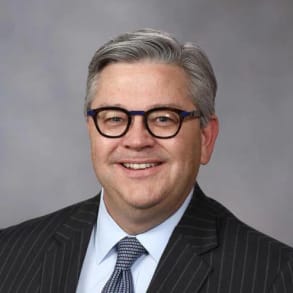Kidney cancer experts Bradley C. Leibovich, M.D. , R. Houston Thompson, M.D. , and Brian A. Costello, M.D. , discuss the multispecialty integrated approach they take to kidney cancer care at Mayo Clinic Comprehensive Cancer Center. Their practice draws on the best surgical, imaging, technical and pathology practices and is supported by a team of care providers who specialize not only in genitourinary disease, but in kidney cancer specifically.
In recent years, advancements and innovative therapies have emerged for kidney cancer, including many safer and less invasive options than had previously been available. The Cancer Center is an extremely high volume practice that treats patients at all stages of renal cancer disease.
kidney cancer patients at Mayo Clinic benefit from the best surgical options. The best technology, the best imaging, the best pathology and clinicians that have expertise and specialize not just in genital urinary diseases but specifically in kidney cancer. We have so many more options today than we did decades ago. The treatments are much safer, much less invasive and much more effective. It's a whole team approach to care within this clinic and at any given time we have complete ability to talk to pathologists, to talk to interventional radiologist, to talk to diagnostic radiologist, to talk to radiation oncology. Those are really the key people who rely on in this space. But the beauty of Mayo Clinic also is that it's a multi specialty integrated practice. So if there is another surgical specialist who needs to get involved, we really have access to those people very quickly. We have an extremely high volume practice. We're used to dealing with patients at all stages of disease from very early to extremely complex. Multidisciplinary care needs, including integration of systemic therapy with our colleagues in medical oncology, multiple surgical disciplines. In addition to urology and when necessary radiation oncology or other specialties. Is that multidisciplinary care that allows us to deliver the best outcomes interventional radiology program here at Mayo has really pioneered and led the way in terms of per cutaneous ablation for smaller renal tumors. There's a lot of information about new therapies in terms of systemic therapy from a medical oncology standpoint, including use of immunotherapy which in first line treatment has really come on the scene. Just since 2018, we have had five total immunotherapy based treatments FDA approved in first line because of all the recent changes in how we manage kidney cancer with a proliferation of new drugs, having multiple opinions from a surgical and medical oncology perspective for each one of our patients has been critically important to us delivering the best care we can and it's never been easier to get a second opinion now that video visits are so common when you entrust us with your patients and refer a patient with a complex kidney cancer. At the Mayo Clinic, we value your input and guidance and how we care for this patient and value the partnership that we can develop with you regarding their ongoing care.



